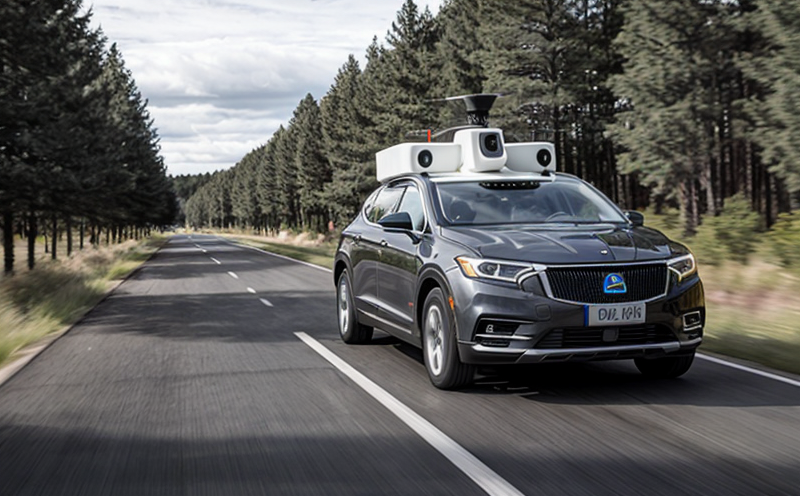SAE J3114 LiDAR Performance Verification for Autonomous Systems
The SAE J3114 standard provides a comprehensive framework for verifying and validating LiDAR performance in autonomous systems. This service ensures that the LiDAR sensors used in these systems meet stringent requirements to guarantee accurate data collection, robust mapping capabilities, and reliable navigation. The testing process is designed to simulate real-world conditions, ensuring that the LiDAR technology functions optimally under various environmental factors such as lighting, weather, and terrain.
The SAE J3114 standard specifies detailed protocols for assessing key performance indicators (KPIs) of LiDAR systems. These KPIs include range accuracy, angular resolution, field-of-view consistency, and point cloud density. By adhering to these standards, we can provide clients with confidence that their autonomous systems will perform reliably in complex environments.
The testing process begins with meticulous preparation of the test environment and LiDAR units. This involves setting up controlled scenarios that mimic real-world driving conditions. The use of advanced sensors, cameras, and other instrumentation ensures precise measurement and validation of LiDAR performance metrics. Our team of experts then conducts rigorous tests to evaluate the accuracy and consistency of LiDAR data across different operating conditions.
Following testing, comprehensive reports are generated detailing the results. These reports provide detailed insights into the performance of the LiDAR systems under evaluation. They include graphical representations of test data, statistical analyses, and recommendations for potential improvements or modifications to enhance system reliability. Our clients receive a clear understanding of their LiDAR technology's capabilities and limitations.
The SAE J3114 standard is widely recognized in the industry as a benchmark for LiDAR performance verification. Compliance with this standard ensures that autonomous systems are safe, reliable, and capable of performing critical tasks in challenging environments. By leveraging our expertise and state-of-the-art facilities, we offer unparalleled testing services tailored to meet the stringent requirements set forth by SAE J3114.
Our commitment to quality extends beyond just meeting regulatory standards; it also encompasses continuous improvement and innovation within our processes. We stay abreast of emerging technologies and methodologies in autonomous vehicle development, ensuring that our testing capabilities remain at the forefront of industry best practices.
- Data Accuracy: Ensuring precise data collection through standardized test procedures
- Ruggedness: Evaluating system resilience against environmental factors such as temperature fluctuations and humidity levels
- Interoperability: Assessing compatibility with other onboard systems and communication protocols
- Prediction Capabilities: Testing the ability to accurately predict obstacles and pathways in dynamic environments
Through our rigorous testing methodologies, we provide clients with robust evidence of LiDAR performance. This not only enhances trustworthiness but also supports safer and more efficient autonomous systems.
Our approach ensures that each stage of the testing process is meticulously planned and executed, resulting in reliable and actionable insights for our clients. By partnering with us, businesses can gain invaluable information about their LiDAR technology, facilitating informed decision-making processes and fostering innovation within their organizations.
Benefits
Compliance with SAE J3114 offers numerous advantages to manufacturers and developers of autonomous systems. By adhering to these standards, companies demonstrate their commitment to quality assurance and regulatory compliance, which can significantly enhance customer confidence in the reliability of their products.
- Improved Safety: Ensures that LiDAR technology performs consistently under various conditions, reducing risks associated with malfunctions or errors
- Elevated Reputation: Establishes a reputation for delivering high-quality autonomous solutions, attracting more customers and partnerships
- Regulatory Compliance: Helps businesses meet international standards, thereby facilitating smoother market entry into different regions
- Innovation Leadership: Encourages continuous improvement in technology development, positioning companies as leaders in innovation within the industry
- Cost Efficiency: Identifies issues early in the development cycle, minimizing costly rework and delays
- Predictive Maintenance: Enables proactive identification of potential failures, allowing for timely repairs before they become critical
By adopting SAE J3114 LiDAR performance verification services, organizations can benefit from enhanced safety measures, increased market acceptance, and long-term cost savings. These advantages contribute to overall business success and growth.
Industry Applications
The SAE J3114 standard finds application across multiple sectors where autonomous systems are deployed. This includes automotive manufacturing, robotics, drones, and smart cities, among others. In each of these fields, the accuracy and reliability of LiDAR technology play crucial roles in enabling safe and efficient operations.
- Automotive: Ensures that self-driving cars can navigate safely through complex urban environments
- Robotics: Supports advanced robotic systems capable of performing tasks autonomously, enhancing productivity and versatility
- Drones: Enables precision agriculture, inspection drones, and search & rescue missions to operate effectively
- Smart Cities: Facilitates the integration of autonomous vehicles with public transportation networks for seamless mobility solutions
The versatility of SAE J3114 testing ensures that LiDAR technology can be adapted to meet specific needs across diverse industries. This flexibility allows businesses to leverage advanced sensor technologies in innovative ways, driving forward technological advancements and societal benefits.





